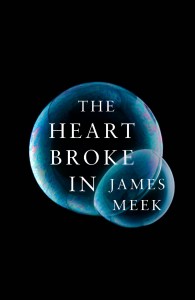 Published by Canongate 30 August 2012
Published by Canongate 30 August 2012
551pp, hardback, £17.99
Reviewed by NJ Cooper
James Meek, whose The People’s Act of Love (2005) was long-listed for the Man Booker prize, has now written a large novel that manages to be both old fashioned and intensely modern. It concerns interlocking extended families and explores moral choices and notions of good and evil against a background of experimental science and reality television.
At the heart of the narrative are siblings Richie and Bec Shepherd, whose father was a famous army hero who resisted IRA torture during the Troubles and was murdered for it. Richie, a once successful rock star, is now married with children and fronts a grubby television programme called Teen Makeover, improving bad teenage bands. To slake his nastier urges, he is conducting an affair with a sophisticated fifteen-year-old schoolgirl.
His sought-after sister is dividing her time between the UK and Africa, developing a vaccine against malaria and has made herself host to Haemopterous gregii, a harmless parasite involved in her researches. Unfortunately, although it is called harmless, gregii does randomly interfere with her sight and could, theoretically, render her blind. Here is one of the choices: do you use the parasite to vaccinate children against malaria and risk damaging their sight? Other choices, much more personal, follow.
Having named the parasite after her heroically dead father, Bec feels sentimental about it and resists ridding her body of it, even when that is the obviously right thing to do. She becomes engaged to the editor of a loathsome, muck-raking tabloid newspaper by casual accident, then hurts him unbearably when she gives him back his ring. This rejection triggers his psychotic need for vengeance and he proceeds to do his worst, losing his job on the way.
Bec is demonstrably one of the good characters, while the editor and her brother take the opposite role. Joining her on the side of light is Alex, once the drummer in Richie’s first band and now a serious scientist, longing but failing to have children. The links between the two families multiply like Haemopterous gregii itself as the narrative develops.
Meek’s characterization is excellent and the dilemmas he gives the players in his drama are convincing and intense enough to hurt. In clear direct prose, he shows the full unattractiveness of the smug Pharisees who are certain they know what is right, while still making it clear that they suffer too. And he manages to do all this while keeping the pages turning as fast as any thriller. This is a feast of a novel, to which I shall return again and again.
